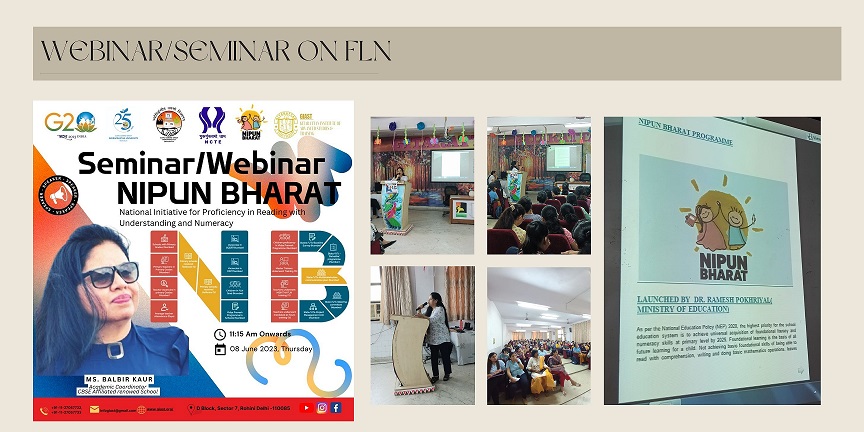
A special seminar on NIPUN BHARAT was conducted by Ms. Balbir Kaur, providing valuable insights and information. The seminar focused on the National Initiative for Proficiency in Reading with Understanding Numeracy (NIPUN BHARAT) and its significance in improving the education system, particularly for children between the ages of 3 and 9. Implemented in 2022, this scheme aims to enhance the educational experience of children and is aligned with the National Education Policy (NPE).
Ms. Kaur began the session by introducing NIPUN BHARAT, emphasising how the COVID-19 pandemic has adversely affected the education system, particularly for young children. This scheme was implemented in all schools to address these challenges and provide better opportunities for children's development.
Ms. Kaur discussed FLN as an integral part of NIPUN BHARAT. Its primary goal is to strengthen the foundational skills of children, enabling them to comprehend literature and grasp basic numeracy concepts such as addition and subtraction. By building a strong foundation, students can better handle complex subjects and foster a love for learning.
Ms. Kaur highlighted the concept of teaching students in their mother tongue before introducing a second language, usually English. This approach enhances understanding and comprehension. Emphasising vocabulary development as a crucial component, she stated that by the age of 3, students should be able to write a sentence to facilitate their understanding of subsequent concepts.
The primary objectives of NIPUN BHARAT were discussed, including the promotion of inclusive classrooms, activity-based and discovery-based teaching methods, and relating knowledge to real-life situations. The scheme aims to motivate and encourage students to become engaged readers and learners. Additionally, capacity building programs such as NISHITA and DIKSHA have been launched to enhance teachers' skills and knowledge.
A key feature of NIPUN BHARAT is its focus on reducing dropout rates and facilitating a smoother transition from primary to upper primary schooling. As stakeholders, it is crucial to track students' learning progress to help them develop better skills and improve the overall quality of education in the country.
Conclusion: The seminar led by Ms. Balbir Kaur provided valuable insights into NIPUN BHARAT and its role in improving the education system. The scheme's focus on foundational literacy and numeracy, the importance of mother tongue, and the objectives of inclusive classrooms and engaged learning were highlighted. By tracking students' progress and implementing effective strategies, we can contribute to reducing dropouts and ensuring a seamless educational journey for every child.